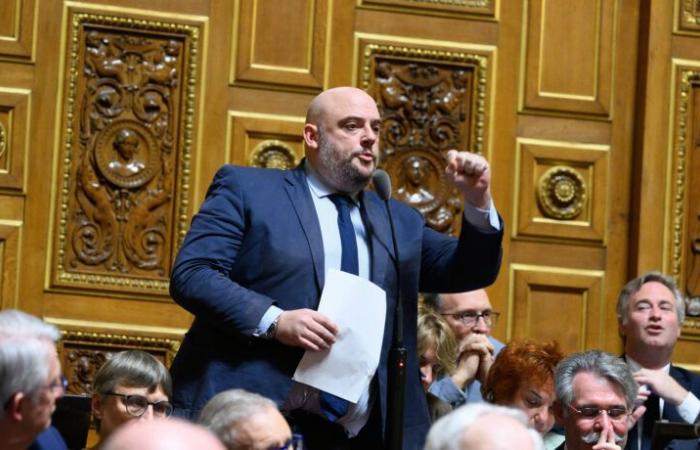For the senatorial left, the 2025 budget takes on a new dimension. With the Barnier government, the left-wing senators find themselves being the only opposition force, now that the centrist LR-Union senatorial majority supports the executive, alongside the Macronists.
“The right/left debate has once again become structuring”
“The right/left debate has become structuring again,” notes Thomas Dossus, senator for the Ecologists (ex-EELV) from Rhône. This finance bill (PLF) is an opportunity for the left to close ranks. “Our role is to unite the different groups of the left as much as possible. This is done much more easily than previous PLFs,” explains the environmentalist. And if there is no NFP in the Senate – there are no LFI senators – the amendments presented to the Assembly are a source of inspiration for the senatorial left.
Concretely, the PS, environmentalists and communist groups (CRCE-K) will present “11 common amendments”, announces Thomas Dossus. In particular “a measure that brings the left together: the return of the ISF, with a climate component”. Enough to bring in between 10 and 15 billion euros. But also a tax on superprofits, the return of the CVAE (a tax on businesses partly removed by Emmanuel Macron), a 1.5 point increase in DMTO (notary fees), “a real tax on transactions financial”, the reinstatement of the exit tax or the increase in the mobility payment “to finance the transport of tomorrow”. A presentation common to the three groups is in the pipeline. He summarizes: “We are working with the PS and Communist groups to form a common front, with amendments tabled in the same way to show that another budget is possible.”
“The effort required of communities will have an impact on people”
But we are in the Senate. And in the High Assembly, the communities are never far away, particularly during the budget. While the senatorial majority shows itself as a defender of communities by wanting to reduce the effort required of them from 5 to 2 billion euros (read our article for details), environmentalist senators do not hesitate to point out that the effort nonetheless remains there. “We are in an unprecedented situation. For the first time in its history, the Senate is letting go of local authorities,” denounces Ghislaine Senée, senator for the Ecologists of Yvelines. If she recognizes “a reduction in the precautionary fund” with the desire “to smooth out the situation”, for the senator, “we must give communities the means to be able to act”. Stressing that she has “the phone that gets hot, even (she) who is in a more right-wing department”, Ghislaine Senée insists:
By adding other measures that affect communities, such as the reduction in the green fund (-1.5 billion euros) or the 300 million euros in savings on the bicycle plan, environmentalists arrive at a total of 10 billion euros of effort requested from communities in the government text. “Of the 25 billion savings in the PLF, 40% concern communities,” says Grégory Blanc, environmentalist senator from Maine-et-Loire.
For Ghislaine Senée, “the effort required of communities will have repercussions on people, the most modest as well as the middle classes. And municipalities will increase property taxes.” She also points out the consequences of a reduced precautionary fund, as desired by the senatorial majority. “It was to be used to finance climatic hazards. But if we go from 3 to 1 billion euros, what do we do? » asks the senator from Yvelines. “And which community believes that this reserve fund will be returned to the nearest euro? » she asks again, even though the majority has modified the text in this sense. The environmentalist senator is surprised: “The Senate understands that revenues must not be touched. And accept the game of hitting the pockets of communities.” “There is a change of footing of the senatorial majority. The majority were opposed to the small music of the communities which would have aggravated the deficit. But by correcting the fund, it endorses the government's theory that communities are responsible for part of this debt,” Thomas Dossus in turn criticizes.
The “Zucman tax” on the richest “to bring in 16 billion euros”
Environmentalists do not only intend to present amendments with the left and look for LR lice on communities. They will obviously present their own amendments. They filed “between 150 and 200”. The ecologists intend in particular to defend “the Zucman tax”, which consists of taxing at 2% the fraction of assets exceeding one billion euros. Enough to “bring in 16 billion euros” according to Thomas Dossus.
The environmental group will also typically propose a reduction in VAT to 5.5% on public transport, an increase in VAT to 20% on air transport, or even “a Michelin/Total amendment” to integrate these two companies. to the exceptional contribution on large companies desired by Michel Barnier, by broadening the tax base, while reducing the weight of the surcharge for companies producing in France.
“There will be a PLFR in February or March to correct the recessive impact, that’s obvious”
Finally, the last complaint from environmentalists about this budget: its “insincerity”, according to Grégory Blanc. The environmentalist senator from Maine-et-Loire points to “a recessive effect of the budget on growth, between -0.6 and -0.8%”. “In reality, this budget was done with a wet finger,” scoffs Grégory Blanc, who already predicts “a draft amending finance law (PLFR) in February or March to correct this recessive impact, that’s obvious. Finally, if there is still a government.”
France






